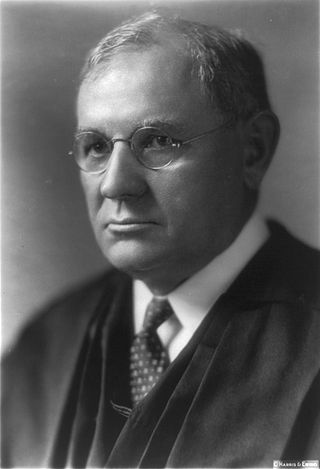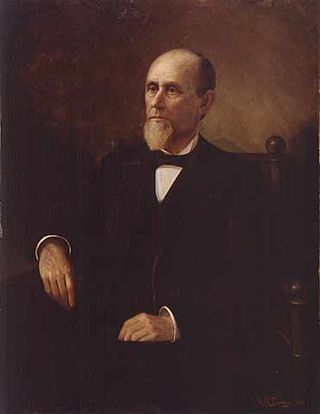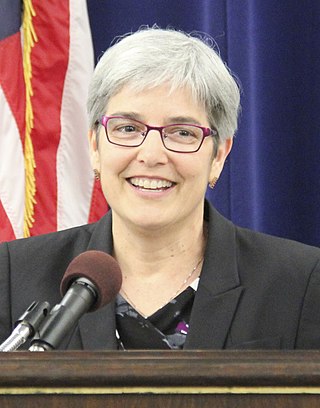
Oakland is a city in Coles County, Illinois, United States. The population was 739 at the 2020 census.

Crookston is a city in the U.S. state of Minnesota. It is the county seat of Polk County. The population was 7,482 at the 2020 census. It is part of the "Grand Forks, ND-MN Metropolitan Statistical Area" or "Greater Grand Forks".

Warren Earl Burger was an American attorney and jurist who served as the 15th chief justice of the United States from 1969 to 1986. Born in Saint Paul, Minnesota, Burger graduated from the St. Paul College of Law in 1931. He helped secure the Minnesota delegation's support for Dwight D. Eisenhower at the 1952 Republican National Convention. After Eisenhower won the 1952 presidential election, he appointed Burger to the position of Assistant Attorney General in charge of the Civil Division. In 1956, Eisenhower appointed Burger to the United States Court of Appeals for the District of Columbia Circuit. Burger served on this court until 1969 and became known as a critic of the Warren Court.

The United States Court of Appeals for the Eighth Circuit is a United States federal court with appellate jurisdiction over the following United States district courts:

Jeter Connelly Pritchard was a lawyer, newspaperman, United States Senator and a United States circuit judge of the United States Court of Appeals for the Fourth Circuit and of the United States Circuit Courts for the Fourth Circuit and previously was an associate justice of the Supreme Court of the District of Columbia. Earlier in his political career he served in the North Carolina House of Representatives. He was a Republican who was part of the populist fusion political wave before later opposing civil rights for African Americans.

Pierce Butler was an American jurist who served as an associate justice of the Supreme Court of the United States from 1923 until his death in 1939. He was a staunch conservative and was regarded as a part of the Four Horsemen, the conservative bloc that dominated the Supreme Court during the 1930s. A devout Catholic, he was also the sole dissenter in the later case Buck v. Bell, though he did not write an opinion.
Republican Party of Minnesota v. White, 536 U.S. 765 (2002), was a decision of the Supreme Court of the United States regarding the First Amendment rights of candidates for judicial office. In a 5–4 decision, the court ruled that Minnesota's announce clause, which forbade candidates for judicial office from announcing their views on disputed legal and political issues, was unconstitutional.

William Mitchell College of Law was a private, independent law school located in St. Paul, Minnesota, United States, from 1956 to 2015. Accredited by the American Bar Association (ABA), it offered full- and part-time legal education in pursuit of the Juris Doctor (J.D.) degree. On December 9, 2015, Hamline University School of Law merged into William Mitchell College of Law, and became the Mitchell Hamline School of Law.

Thomas Wilson was an American lawyer, Minnesota congressman and state legislator, associate justice and the second chief justice of the Minnesota Supreme Court.

David Ryan Stras is a United States circuit judge of the United States Court of Appeals for the Eighth Circuit. He is a former Associate Justice of the Minnesota Supreme Court.
Roberts v. United States Jaycees, 468 U.S. 609 (1984), was a decision of the Supreme Court of the United States overturning the United States Court of Appeals for the Eighth Circuit's application of a Minnesota antidiscrimination law. The case established what was at the time the prevailing framework for analyzing claims of associative freedom, holding that the Minneapolis branch of the United States Jaycees could not bar women from becoming voting members.
Erin Matson is an American writer and feminist activist. Matson was 23 when she became the youngest-ever state chapter president in the history of the National Organization for Women (NOW). In June 2009, she was elected Action Vice President of NOW. She is a co-director of the activist organization Reproaction with Pamela Merritt.
Henry Matson Waite was a lawyer, judge, and chief justice of the Connecticut Supreme Court.
United States v. Knotts, 460 U.S. 276 (1983), was a United States Supreme Court case regarding the use of an electronic surveillance device. The defendants argued that the use of this device was a Fourth Amendment violation. The device in question was described as a beeper that could only be tracked from a short distance. During a single trip, officers followed a car containing the beeper, relying on beeper signal to determine the car's final destination. The Court unanimously held that since the use of such a device did not violate a legitimate expectation of privacy there was no search and seizure and thus the use was allowed without a warrant. It reasoned that a person traveling in public has no expectation of privacy in one's movements. Since there was no search and seizure there was not a Fourth Amendment violation.

Margaret Helen Chutich is an American lawyer and judge who has served as an associate justice of the Minnesota Supreme Court since 2016, when she was appointed by Governor Mark Dayton. She previously served as a judge on the Minnesota Court of Appeals.

Wilhelmina Marie Wright is a United States district judge of the United States District Court for the District of Minnesota. She is the only jurist in Minnesota's history to be state district court judge, appellate court judge and state supreme court justice. She was formerly an associate justice of the Minnesota Supreme Court, a judge of the Minnesota Court of Appeals, and a judge of the Minnesota District Court, Second Judicial District.
The Matson Trial (1847), officially Matson v. Ashmore et al. for the use of Bryant, was a freedom suit by former slave Anthony Bryant on behalf of his family in Coles County, Illinois. It is noted for the unusual circumstance where Abraham Lincoln, the future emancipator of slaves, defended a slave-owner against a slave. The case pitted Lincoln and former Illinois Attorney General Usher F. Linder against former US Representative Orlando B. Ficklin. Ficklin's case proved successful, and Bryant's family was emancipated based on free soil doctrine.
Leroy E. Matson was an American jurist.













